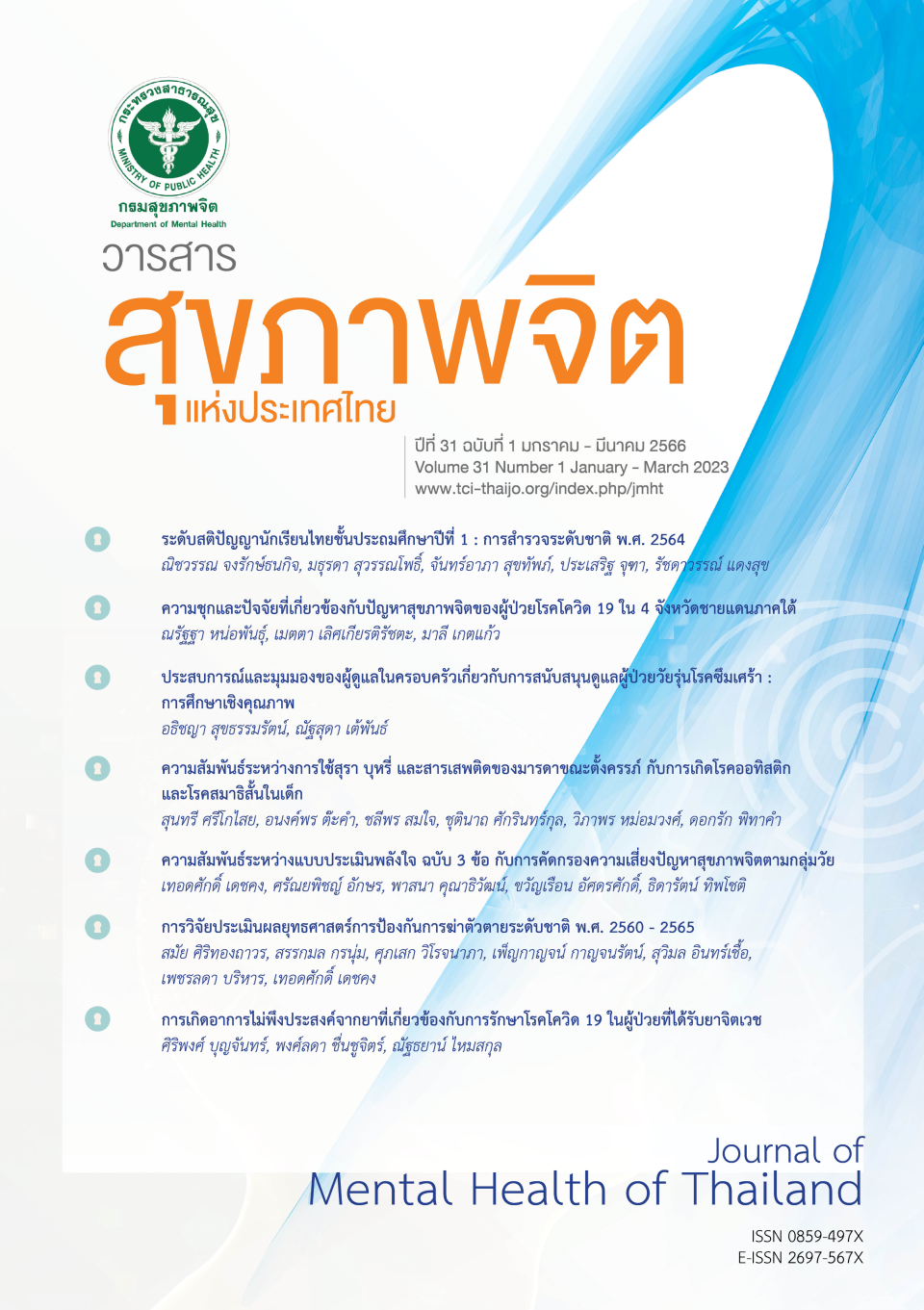ระดับสติปัญญานักเรียนไทยชั้นประถมศึกษาปีที่ 1 : การสำรวจระดับชาติ พ.ศ. 2564
คำสำคัญ:
นักเรียนไทย, ประถมศึกษาปีที่ 1, ระดับสติปัญญาบทคัดย่อ
วัตถุประสงค์ : เพื่อศึกษาค่าเฉลี่ยและการกระจายของระดับสติปัญญาในนักเรียนไทยชั้นประถมศึกษาปีที่ 1 พ.ศ. 2564
วิธีการ : ใช้ข้อมูลจากโครงการสำรวจสถานการณ์ระดับสติปัญญาและความฉลาดทางอารมณ์เด็กไทยชั้นประถมศึกษาปีที่ 1 และปัจจัยที่เกี่ยวข้อง ประจำปี 2564 ในกลุ่มตัวอย่างที่เป็นตัวแทนของนักเรียนชั้นประถมศึกษาปีที่ 1 ในแต่ละจังหวัด สุ่มตัวอย่างแบบ 3 ขั้น แต่ละขั้นสุ่มตัวอย่างแบบชั้นภูมิ เก็บข้อมูลตั้งแต่ ธันวาคม พ.ศ. 2563 ถึง ธันวาคม พ.ศ. 2564 ประเมินระดับสติปัญญา (intelligence quotient; IQ) ด้วยแบบทดสอบ standard progressive matrices โดยนักจิตวิทยาคลินิก วิเคราะห์ข้อมูลด้วยสถิติเชิงพรรณนา ประมาณความชุกและสัดส่วนด้วยวิธีการถ่วงน้ำหนัก
ผล : ผลจากการสำรวจในกลุ่มตัวอย่าง 21,901 คน จาก 69 จังหวัดพบว่า นักเรียนไทยประถมศึกษาปีที่ 1 มีค่าระดับสติปัญญาเฉลี่ยเท่ากับ 102.8 (95% CI = 102.5 - 103.0) จังหวัดที่มีระดับสติปัญญาเฉลี่ยสูงกว่า 100 มี 36 จังหวัด (ร้อยละ 46.7 ของทั้ง 77 จังหวัด) จังหวัดที่มีระดับสติปัญญาเฉลี่ยประมาณ 100 มี 25 จังหวัด (ร้อยละ 32.4) และจังหวัดที่มีระดับสติปัญญาเฉลี่ยต่ำกว่า 100 มี 8 จังหวัด (ร้อยละ 10.3) นักเรียนมีระดับสติปัญญาเฉลี่ยต่ำกว่าเกณฑ์ปกติ (IQ < 90) ร้อยละ 21.7 และมีระดับสติปัญญาอยู่ในเกณฑ์บกพร่อง (IQ < 70) ร้อยละ 4.2
สรุป : ระดับสติปัญญาเฉลี่ยของนักเรียนประถมศึกษาปีที่ 1 พ.ศ. 2564 อยู่ในเกณฑ์ปกติและสูงกว่าค่ากลางของมาตรฐานสากล ในขณะที่ร้อยละของนักเรียนในกลุ่มสติปัญญาบกพร่องยังมากกว่ามาตรฐาน การดำเนินงานด้านการส่งเสริมพัฒนาการและสติปัญญาของเด็กไทยจึงควรให้ความสำคัญกับเด็กกลุ่มนี้มากขึ้น
Downloads
เอกสารอ้างอิง
Neisser U, Boodoo G, Bouchard TJ, Boykin AW, Brody N, Ceci SJ, et al. Intelligence: knowns and unknowns. Am Psychol. 1996;51(2):77-101. doi:10.1037/0003-066X.51.2.77.
Sternberg RJ. Intelligence. Dialogues Clin Neurosci. 2012;14(1):19-27. doi:10.31887/DCNS.2012.14.1/rsternberg.
Hindes Y, Schoenberg MR, Saklofske DH. Intelligence. In: Kreutzer JS, Deluca J, Caplan B, editors. Encyclopedia of Clinical Neuropsychology. New York: Springer; 2011. p. 1329-35.
Moore DS, Notz WI, Flinger MA. The Normal Distribution. In: Moore DS, Notz WI, Fligner MA, editors. The basic practice of statistics. 6th ed. New York: W.H.Freeman and Company; 2013.
Lyn R, Vanhanen T. IQ and the wealth of nations. Westport: Praeger Publishers; 2002.
Lynn R, Becker D. The intelligence of nations. London: Ulster Institute for Social Research; 2019.
Rindermann H. Relevance of education and intelligence at the national level for the economic welfare of people. Intelligence. 2008;36(2):127-42. doi:10.1016/j.intell.2007.02.002.
Raven J. Manual for Raven’s progressive matrices and vocabulary scales. Research supplement No.1: the 1979 British standardization of the standard progressive matrices and mill hill vocabulary scales, together with comparative data from earlier studies in the UK, US Canada, Germany and Ireland. Oxford: Oxford University Press; 1981.
Raven J, Raven JC, Court JH. Manual for Raven’s progressive matrices and vocabulary scales. section 3, standard progressive matrices: (including the parallel and plus versions). Oxford: Oxford University Press; 2004.
สุชีรา ภัทรายุตวรรตน์, กนกรัตน์ สุขะตุงคะ, จริยา จันตระ, วิลาสินี ชัยสิทธิ์, กีรติ บรรณกุลโรจน์, สร้อยสุดา อิ่มอรุณรักษ์. การสร้างเกณฑ์ปกติของแบบทดสอบ Standard Progressive Matrices ในกลุ่มประชากรไทย [The normative score of the standard progressive matrices for the Thai population]. วารสารสมาคมจิตแพทย์แห่งประเทศไทยไทย. 2543;45(1):45-57.
อภิชัย มงคล, ทวีศิลป์ วิษณุโยธิน, ปราณี ชาญณรงค์, โชษิตา ภาวสุทธิไพศิฐ, พรทิพย์ วชิรดิลก. สถานการณ์ระดับสติปัญญาเด็กนักเรียนไทย ปี 2554 [National intelligence quotient survey of Thai students in 2011]. วารสารสุขภาพจิตแห่งประเทศไทย. 2555;20(2):79-89.
จันทร์อาภา สุขทัพภ์, อัมพร เบญจพลพิทักษ์, วนิดา ชนินทยุทธวงศ์, ประเสริฐ จุฑา. ระดับสติปัญญานักเรียนไทยชั้นประถมศึกษาปีที่ 1 ประจำปี พ.ศ. 2559 [Intelligence quotient (IQ) of Thai students in the first year of primary school: national survey 2016]. วารสารสุขภาพจิตแห่งประเทศไทย. 2561;26(3):161-73.
กระทรวงสาธารณสุข. โครงการส่งเสริมพัฒนาการเด็กเฉลิมพระเกียรติสมเด็จพระเทพรัตนราชสุดาฯ สยามบรมราชกุมารี เนื่องในโอกาสฉลองพระชนมายุ 5 รอบ 2 เมษายน 2558. นนทบุรี: กระทรวงสาธารณสุข; 2558.
สำนักงานคณะกรรมการพัฒนาเศรษฐกิจและสังคมแห่งชาติ สำนักนายกรัฐมนตรี. แผนพัฒนาเศรษฐกิจและสังคมแห่งชาติ ฉบับที่ 12 พ.ศ. 2560 – 2564 [National economic and social development plan, no. 12, 2017-2021]. กรุงเทพฯ: สำนักงาน; 2559.
Wicherts JM, Dolan CV, Carlson JS, Van der Maas HLJ. Raven’s test performance of sub-Saharan Africans: average performance, psychometric properties and the Flynn effect. Learn Individ Differ. 2010:20(3);135-51. doi:10.1016/j.lindif.2009.12.001.
บัณฑิต ศรไพศาล, ปราณี ชาญณรงค์. การศึกษาทบทวนองค์ความรู้ด้านทฤษฎีและเครื่องมือประเมินระดับสติปัญญาและความฉลาดทางอารมณ์ (IQ และ EQ) เด็ก [A review of theoretical knowledge and a tool to assess intelligence and emotional intelligence (IQ and EQ) levels in children]. ปทุมธานี: โรงพิมพ์มหาวิทยาลัยธรรมศาสตร์; 2552.
ปราณี ชาญณรงค์, บัณฑิต ศรไพศาล. รายงานวิจัยการพัฒนาเครื่องมือวิจัยเชิงสำรวจสถานการณ์ระดับสติปัญญาเด็กไทย [The development of a survey research instrument for Intelligence Quotients (IQ) test of Thai children]. ปทุมธานี: โรงพิมพ์มหาวิทยาลัยธรรมศาสตร์; 2553.
Mungkhetklang C, Crewther SG, Bavin EL, Goharpey N, Parsons C. Comparison of measures of ability in adolescents with intellectual disability. Front Psychol. 2016;7:683. doi:10.3389/fpsyg.2016.00683.
Trahan LH, Stuebing KK, Fletcher JM, Hiscock M. The Flynn effect: a meta-analysis. Psychol Bull. 2014;140(5):1332-60. doi:10.1037/a0037173.
Flynn JR. Requiem for nutrition as the cause of IQ gains: Raven's gains in Britain 1938-2008. Econ Hum Biol. 2009;7(1):18-27. doi:10.1016/j.ehb.2009.01.009.
Lynn R. What has caused the Flynn effect? Secular increases in the Development Quotients of infants. Intelligence. 2009;37(1):16-24. doi:10.1016/j.intell.2008.07.008.
อัญชลี จุมพฎจามีกร. เชาวน์ปัญญาคืออะไร? [What is intelligence?] [อินเทอร์เน็ต]. กรุงเทพฯ: ภาควิชาจิตเวชศาสตร์ คณะแพทยศาสตร์โรงพยาบาลรามาธิบดี มหาวิทยาลัยมหิดล; [เข้าถึงเมื่อวันที่ 28 ก.ย. 2565]. จาก: https://www.rama.mahidol.ac.th/ramamental/generalknowledge/child/05152014-1100#:~:text=90%2D109,80%2D89
Deoni SC, Beauchemin J, Volpe A, Dâ Sa V. Impact of the COVID-19 pandemic on early child cognitive development: initial findings in a longitudinal observational study of child health. medRxiv [Preprint]. 2022:2021.08.10.21261846. doi:10.1101/2021.08.10.21261846.
ดาวน์โหลด
เผยแพร่แล้ว
รูปแบบการอ้างอิง
ฉบับ
ประเภทบทความ
สัญญาอนุญาต
ลิขสิทธิ์ (c) 2023 วารสารสุขภาพจิตแห่งประเทศไทย

อนุญาตภายใต้เงื่อนไข Creative Commons Attribution-NonCommercial-NoDerivatives 4.0 International License.
- ผู้อ่านสามารถนำข้อความ ข้อมูล จากวารสารไปใช้ไปใช้ประโยชน์ทางวิชาการได้ เช่น เพื่อการสอน เพื่อการอ้างอิง แต่การนำไปใช้เพื่อวัตถุประสงค์อื่น เช่น เพื่อการค้า จะต้องได้รับอนุญาตเป็นลายลักษณ์อักษรจากกรมสุขภาพจิตก่อน
- ความคิดเห็น ข้อมูล และบทสรุปต่าง ๆ ที่ลงตีพิมพ์ในวารสารสุขภาพจิตแห่งประเทศไทยเป็นของผู้เขียนบทความและมิได้แสดงว่ากองบรรณาธิการหรือกรมสุขภาพจิตเห็นพ้องด้วย




